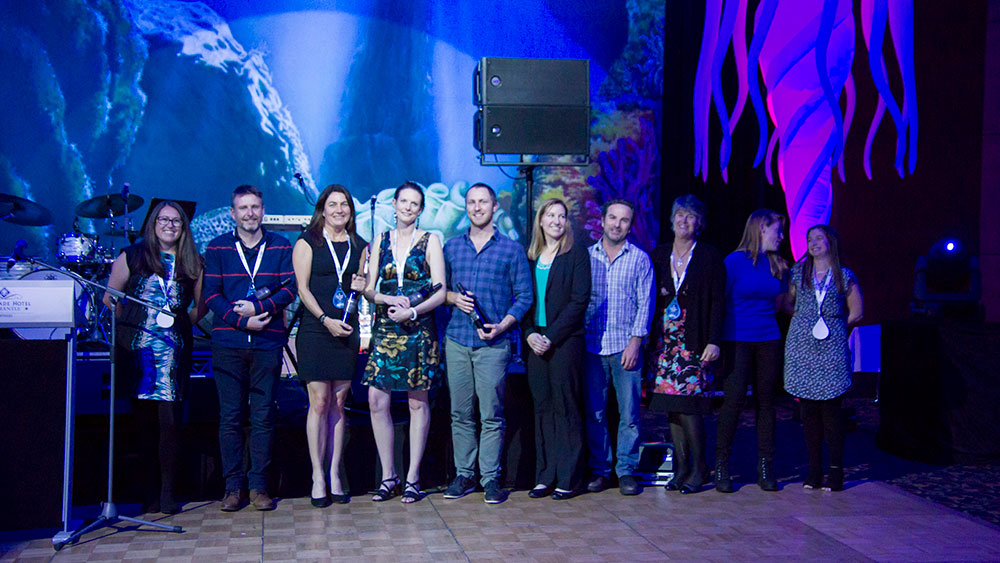
Pulling off a plastic-free conference got the AMSA’s organizing committee excited, Elizabeth Sinclair said. (Photo by Narelle Dybing)
The Great Pacific Garbage Patch — estimated to be three times the size of France — is just one of five offshore zones where tossed single-use plastic swirls in an ever-widening vortex. These massive trash patches have prompted some governments to ban plastic straws and bags and helped spur groups to create sustainability guidelines and pledges — including within the events industry.
But marine scientists know that while every single bit helps, it still can feel like those efforts are just, well, a drop in the ocean. The crisis requires people to adopt wide behavior changes — and where better to start than at their own event.
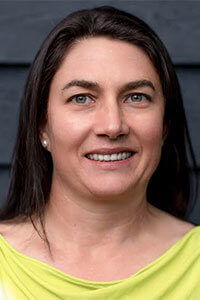
Elizabeth Sinclair
So the Australian Marine Sciences Association (AMSA) “took on the challenge to walk the walk rather than just talk the talk,” according to an AMSA report, going plastic free for its national conference held July 7–11 in Fremantle, near Perth. By providing 100-percent natural tote bags, attaching name badges to lanyards made of bamboo, and, among many other measures, serving espresso drinks in returnable, washable cups, AMSA went as plastic free as possible for the conference, which drew 570 marine science professionals, academics, and students. They gathered at the Esplanade Hotel in coastal Fremantle, the birthplace of the Plastic Free July campaign led by the global Plastic Free Foundation.
AMSA 19’s location, date, and audience meant the decision to go plastic free was “a no-brainer,” Elizabeth Sinclair, Ph.D., told Convene. Sinclair — a senior research fellow at the School of Biological Sciences and The UWA Oceans Institute at the University of Western Australia — is a member of the AMSA Western Australia Branch Board. She helped organize the event, themed “Marine Science for a Blue Economy,” hosted by her state.
“We’re scientists and we work in the marine environment,” Sinclair said, “and most of us are pretty up-to-date with the fact that we don’t want to be contributing plastics to an environment in which we work.”
AMSA’s conference wasn’t the first plastic-free event, but its members have become proselytizers, describing the lessons learned in an article (which Sinclair co-wrote) that was shared with the public on The Conversation website and via social media. And, along with its event management company Encanta, AMSA created a bullet-point list that other event organizers can follow.
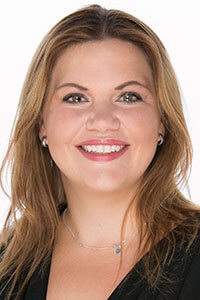
Lynne Greenaway
“A large majority of our clients are moving to sustainable conferences,” said Encanta’s Lynne Greenaway, who managed the AMSA event. “However, this was our first client with a no-plastic approach across all … suppliers.”
The AMSA article attracted global attention. “We didn’t envisage that it would actually get this many reads,” Sinclair said, adding that it is being translated into other languages, including Chinese and Indonesian. “We just thought it might be interesting to write about this and … share some of our ideas and experiences.”
Concrete Steps
Planning for the conference began about 18 months out, Sinclair said. While there were some initial fears it would be difficult to pull off, after the first couple of planning sessions, everyone “really got on board and got excited about the challenge of finding solutions.”
The longer planning window gave them time to overcome hurdles. Someone would say, “‘I’ve managed to find these [sustainable] bags [but] they’ve still got a plastic handle,’ [and] I was like, ‘no, no, we’ll keep looking,’” Sinclair said. “It didn’t take long before someone would have an idea about something they knew about, or they’d seen, and it actually got easier as we got on with it.”
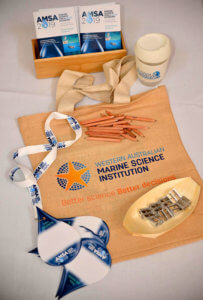
The plastic ban at the AMSA conference extended to delegate giveaways. Workshop leaders and vendors were instructed to leave plastic giveaways at home, too. (Photo by Angela Rossen)
Additionally, Sinclair said, all of the plastic-free adjustments “added zero cost to the overall expense, so it was all within budget.” In fact, in some cases, Greenaway said, going plastic free even reduced costs. “If there were items that had no … substitute, we just went without and this had no impact on the integrity of the event.”
One such example, she said, “that springs to mind” are the plastic sleeves that hold name badges. AMSA did without the sleeves and printed the name badges with a solar-powered printer on slightly thicker cardboard stock that was sustainably sourced.
Wooden Trays and Pencils
To help in traditionally plastic-heavy areas such as food and beverage, Rebecca Prince-Ruiz, executive director of the Plastic Free Foundation, and Alicia Sutton, AMSA’s Western Australia chair, worked with the conference venue and with managers of the various hotels where attendees were staying to root out unnecessary plastic, Sinclair said.
At the event venue, AMSA had glassware and jugs of water, metal cutlery, china, and, she said, “no takeaway, single-use plastic items. No mints and the lollies that are all individually wrapped in plastic. … None of that.”
Snacks or tea breaks often featured whole pieces of fruit served with treats, including nuts and other non-packaged items, on wooden trays.
There were some things, like regulations requiring plastic wrap on prepared food, over which they had no control. But, Sinclair said, “we focused on the things that we could control. … Health regulations are such that you can’t get around it entirely. But you know, with time. …”
Delegates were asked to bring their own reusable water bottles and cups or pre-register to buy them, but if they forgot, glasses or coffee cups were available for use, she said. Also, people running workshops and vendors exhibiting at stalls were instructed “not to bring plastic giveaways, stuff, pens, and things.”
Non-plastic pens are, of course, difficult to find. So attendees were encouraged to bring their own, Sinclair said. “And then we had little boxes of [sustainably sourced] pencils and the metal pencil sharpeners, so if you wanted to use a pencil, you could do that.”
Iron Will
Sinclair, whose work involves seagrass genetics, said she knows that “we were preaching to the converted at the conference. But if everybody manages to influence one or two people and we’ve changed the way our conference organizers are thinking and they already have the solutions, then they can actually influence how other events are run,” she said. “And whether it’s a one-day workshop … or it’s a five-day conference, you can still reduce the use of a lot of these silly things.”
And, thanks to reusable cups, attendees didn’t have to sacrifice having their espresso at a plastic-free event. “That,” she said with a laugh, “was probably the biggest win of the whole conference.”
Cristi Kempf is executive editor at Convene.
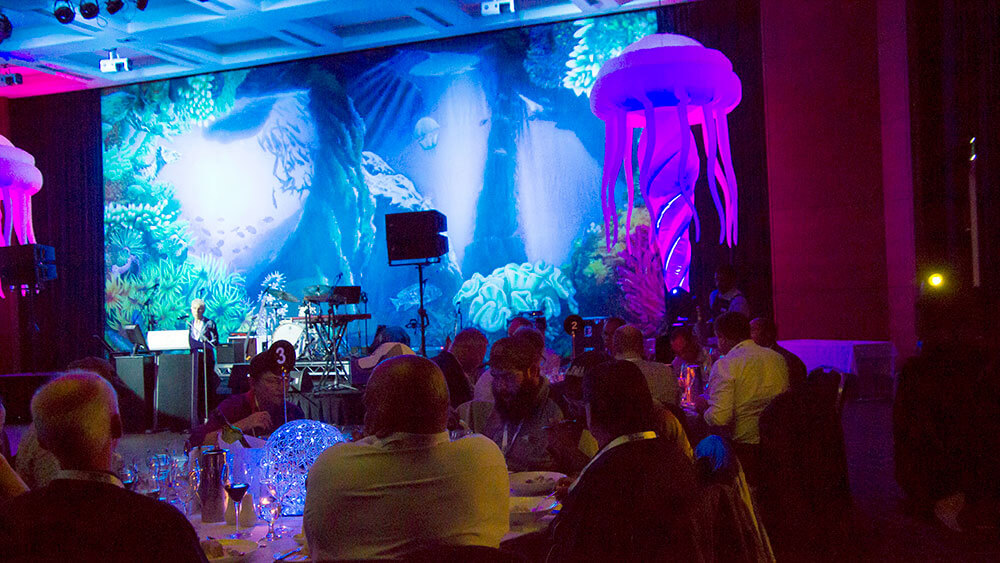
Giant jellyfish were reused from another event to decorate for the conference dinner, while organizers replaced potted plants with artist images that can be used for other AMSA events.
